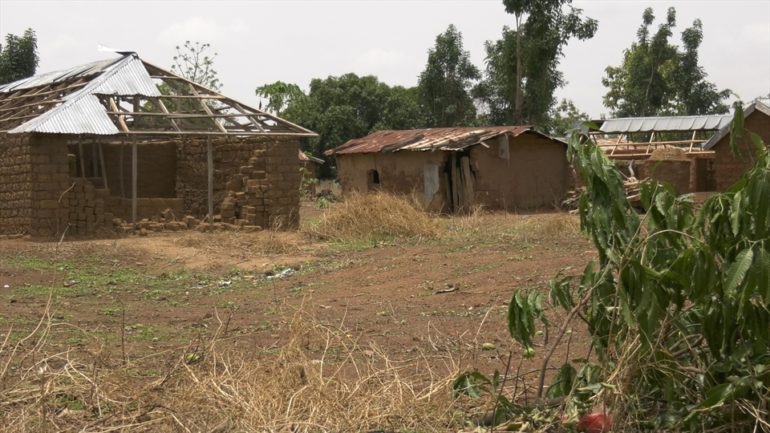A pregnant woman and a child were among four people killed in attacks by suspected Fulani herdsmen in Nigeria’s Plateau State last week.
The attackers targeted the villages of Ancha and Tafigana in the Bassa Local Government area, as reported by news site Nasoweseeamonline.

A village in Southern Kaduna, located in Nigeria’s “Middle Belt”, after an attack by Fulani militants. PICTURE: World Watch Monitor.
Margaret Wakili, 27, from Ancha village and who was six months pregnant, was killed at the farm where she was visiting her husband. They both fled but the attackers caught his wife. As they killed her he heard them shout “‘Allahu Akbar, we have killed infidel, we need to kill more”, he said. He identified the eight attackers as Fulani from Hayin Rukuba. An older woman in the village also was killed.
In Tafigana, a 46-year-old father, Thomas Wollo, and his seven-year-old son Nggwe Thomas were killed and beheaded when they returned home from choir practice on the night of 14th July.
Following the killings, the attackers went on to a nearby village where they destroyed crops to the value of millions of naira, according to Zongo Lawrence, Publicity Secretary of Miango Youth Development Association.
“We have been experiencing daily attacks by Fulani herdsmen in our communities, most especially on Sundays and Thursdays during worship days or market days, respectively. They want to displace us at all cost and we are not ready to give out our lands no matter their evil act,” he said.
Meanwhile, Nigeria’s former president, Olusegun Obasanjo, has said he is deeply concerned about the downward spiral of violence the country seems to be caught in, reports the The Guardian.
In an open letter addressed to the country’s current president Mohammadu Buhari, he warned of the consequences if the government can’t get a handle on the situation. Handing the country over to the likes of the Islamist Boko Haram insurgency and Fulani militants “may lead to planned reprisal attacks against Fulanis, which may inadvertently or advertently mushroom into pogrom or Rwanda-type genocide that we did not believe could happen and yet it happened,” he said.
Nigeria’s government has been criticised for its inaction which, according to Amnesty International, has led to an escalation of the conflict between herders and farmers.
As World Watch Monitor has reported, the attacks are concentrated in the states in Nigeria’s “Middle Belt” which straddles the precolonial line dividing the predominantly Muslim north from its Christian south.
Some Christian groups, such as the National Christian Elders Forum, have accused the Buhari government of not doing enough, and of using the conflicts to advance its own agenda. The Nigerian High Commissioner to the UK, George Adetola Oguntade, denied the claim in a letter sent to British parliamentarians last month.
“The safety and security of all Nigerians, whatever their faith, is a fundamental priority of the Buhari Government”, he wrote. “The government knows that Nigeria can only achieve its potential if there is religious tolerance and cooperation”.
The security challenges in Nigeria are neither religious nor ethnic, the High Commissioner wrote. He said the clashes between herders and farmers over land were predating the Buhari administration. As for the Boko Haram insurgency, he said the government was committed to eradicate the terrorist group.
In response, the elders forum said the High Commissioner is in denial about how “conflicting ideologies of democracy and Sharia [are] affecting the country, men and women and what may happen to future generation of Nigerians”.
The Nigerian government and some analysts have portrayed the events unfolding in Nigeria as disputes over resources. Others, however, say the thousands of Christians killed, in what no longer are “spontaneous reactions to provocations but pre-meditated scorched-earth campaigns”, is evidence a more sinister agenda is at work and that refusing to acknowledge it is hampering efforts to find solutions.
In Nigeria’s north-east and Middle Belt, where Boko Haram and militant herdsmen of the ethnic Fulani have wracked havoc, the harassment and violence poses an existential threat to the church, said Rev Gideon Para-Mallam in the latest edition of Lausanne Global Analysis magazine.
It has already led to a “virtual abandonment of missions and evangelism in some affected areas” and left unchecked, “the death of the church [in Nigeria] could be a matter of years away”, he said.
Young Christians in particular have become increasingly frustrated with what they perceive to be inaction by the government and the church. Para-Mallam said that, in the majority-Muslim north, decades of pressure on Christians has caused “faith fatigue” and discouragement, leading some to find security elsewhere, including in a militant response.






